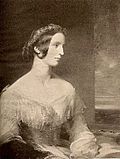James Broun-Ramsay, 1st Marquess of Dalhousie
James Andrew Broun-Ramsay, 1st Marquess of Dalhousie KT, PC (22 April 1812 – 19 December 1860), known as The Earl of Dalhousie between 1838 and 1849, was a Scottish statesman and a colonial administrator in British India. He served as Governor-General of India from 1848 to 1856.
The Marquess of Dalhousie | |
|---|---|
 | |
| Governor-General of India | |
| In office 12 January 1848 – 28 February 1856 | |
| Monarch | Victoria |
| Prime Minister | Lord John Russell The Earl of Derby The Earl of Aberdeen The Viscount Palmerston |
| Preceded by | The Viscount Hardinge |
| Succeeded by | The Viscount Canning |
| President of the Board of Trade | |
| In office 5 February 1845 – 27 June 1846 | |
| Monarch | Victoria |
| Prime Minister | Sir Robert Peel |
| Preceded by | William Ewart Gladstone |
| Succeeded by | The Earl of Clarendon |
| Personal details | |
| Born | 22 April 1812 Dalhousie Castle, Midlothian, Scotland |
| Died | 19 December 1860 (aged 47) Dalhousie Castle, Midlothian |
| Citizenship | United Kingdom of Great Britain and Ireland |
| Spouse(s) | Lady Susan Hay (d. 1853) |
| Mother | Christian Broun |
| Father | George Ramsay |
| Alma mater | Christ Church, Oxford |
| Known for | Doctrine of Lapse |
He introduced the Doctrine of Lapse.Several independent Indian states were annexed under this policy-Satara,Nagpur,Jhansi and many others. Kingdoms like Awadh were annexed using a strategy known as misgovernment.
Lord Dalhousie has made contributions to modern India by constructing railways and roads.He built the first railway line which was between Bombay and Thane.He passed The Hindu Remarriage Act in 1856.
James Broun-Ramsay, 1st Marquess Of Dalhousie Media
Portrait of Lord Dalhousie by John Watson-Gordon, 1847.


